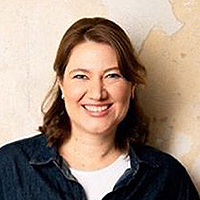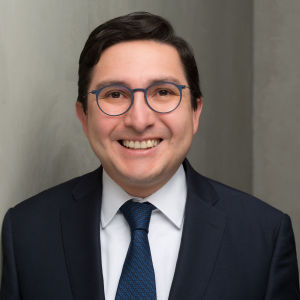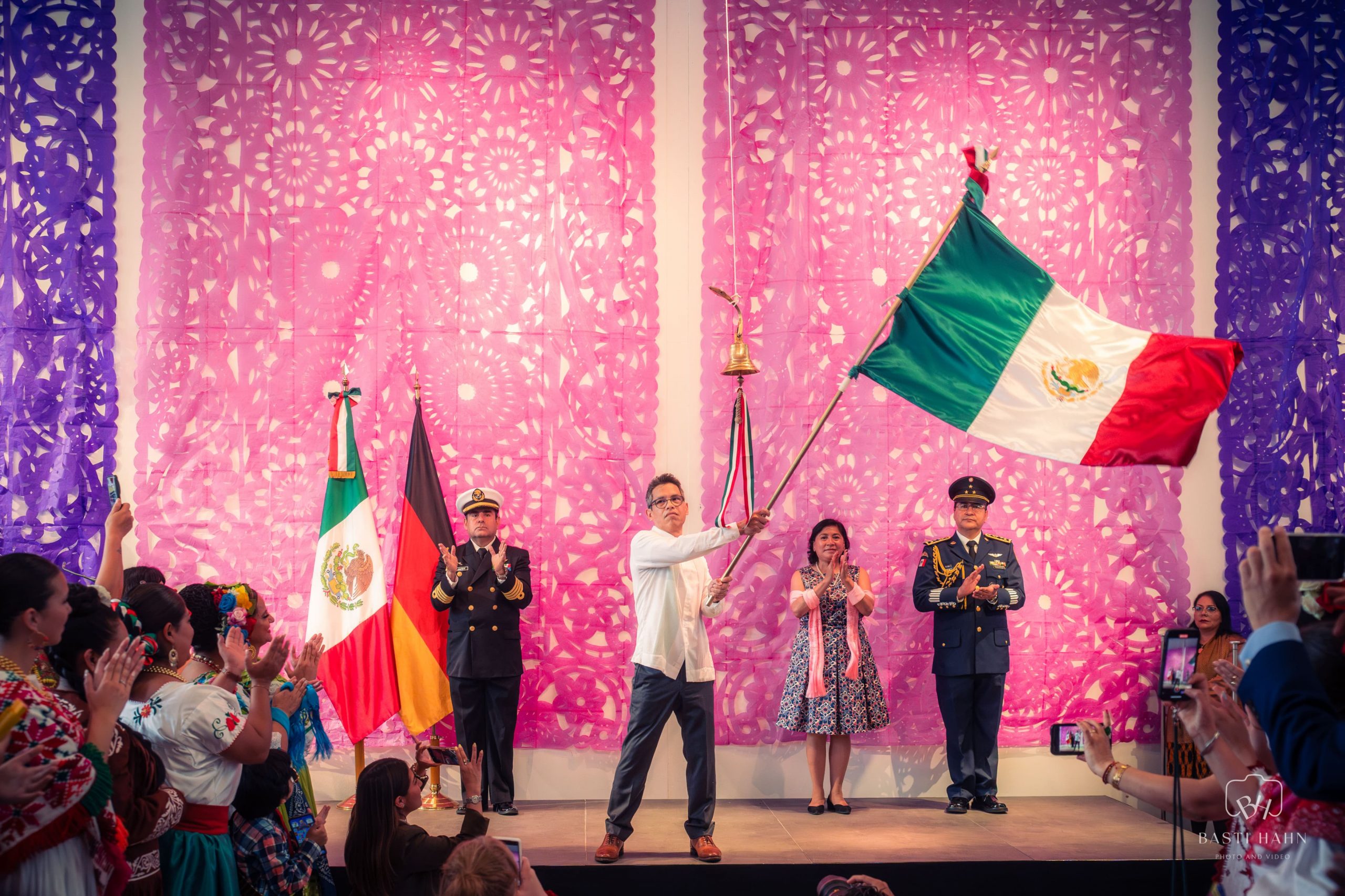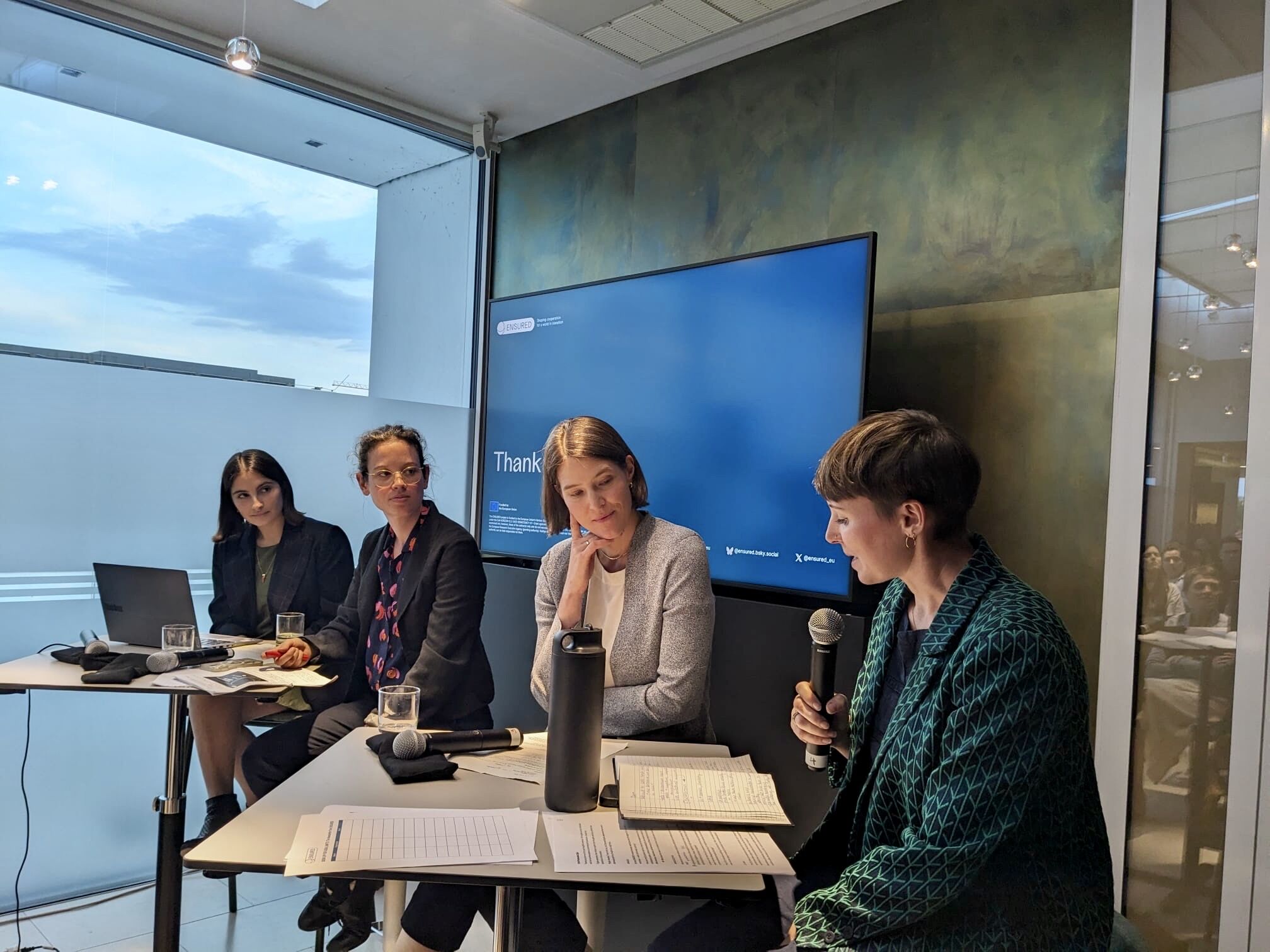Migration and Middle Powers + Euro Outlook and Trade Challenges + UN’s Ten Crises + Tariff Turmoil + Africa’s Creative Economy + Cyber Diplomacy + Baerbock at UNGA
Which international organization is known as the main platform for multilateral diplomacy?
The United Nations (UN).
 Dear Readers,
Dear Readers,
Welcome to the Diplomacy Berlin Newsletter.
Our focus this week spans a range of global and regional dynamics shaping today’s diplomacy. We feature an in-depth conversation with Dr. Zirahuen Villamar, reflecting on migration governance between Mexico, the U.S., and Europe, the power of strategic communication in diplomacy, and the role of middle powers in strengthening multilateralism amid an age of polycrisis.
Beyond this, we look at Europe’s economic outlook amid tariff headwinds, the urgent reforms needed at the United Nations, and how shifting trade rules are redrawing the global economy. We spotlight Africa’s creative industries as a driver of growth, explore the launch of a new UN cyber diplomacy mechanism, and reflect on the historic election of Annalena Baerbock as President of the 80th UN General Assembly. Together, these developments highlight both the opportunities and challenges of navigating today’s interconnected world.
We also recognize and celebrate this week’s national days: Costa Rica, El Salvador, Guatemala, Honduras, Chile, Belize, Malta, Mexico, and Armenia.
Stay engaged with us as we continue to spotlight the voices, policies, and events shaping Berlin’s diplomatic community and the wider world.
As always, if you would like to contribute content for upcoming newsletters or press releases, please contact us at editorial@diplomacy.berlin.
With best regards,
Sigrid Arteaga
Bridging the Global North and South: Mexico and Germany as Middle Powers
Dr. Zirahuén holds a BA in Economics, an MA in European Integration, and a PhD in Political Science, with expertise in International Relations, German foreign policy, and Latin America. Currently, he is a researcher at Minor Projektkontor für Bildung und Forschung in Berlin, focusing on migration and integration. His professional experience includes serving as Press Attaché and Chief of Staff at the Mexican Embassy in Germany (2019–2024), as well as roles in academia, project management, and public diplomacy consulting. He is passionate about building bridges between international perspectives and advancing global cooperation through research, diplomacy, and strategic dialogue.

Migration remains at the center of U.S. – Mexico relations, with new challenges around border policy and labor mobility. From your perspective, how can Mexico position itself not only as a country of origin and transit, but also as a strategic partner for the U.S. and Europe in shaping fairer migration governance?
Migration is a global phenomenon, and it should be seen as such: a process taking place everywhere in the world, and an opportunity if interpreted and addressed in the right way. Mexico is a country of migration: it is a source, a place of transit, and also a destination. With this experience, Mexico has a tradition of fostering international agreements that support orderly migration and the protection of migrants in their countries of destination.
Despite all the challenges the country currently faces, it has proven to be a fundamental partner in managing migration to the United States, which is of unparalleled magnitude worldwide. At the same time, it has also become a partner for European countries that require the incorporation of specialists in specific professional fields into their labor markets. In Germany’s case, Mexico is a partner in many federal, state, and private programs aimed at attracting skilled personnel. This very week, the President of the German Federal Council (Bundesrat) is in Mexico, and the skilled migration of Mexicans to Germany is one of the most important items on her agenda.
All of this shows that Mexico but also many other countries of this scale and with their dual role as senders and recipients of migration plays a central role in managing migration and in shaping international regimes for it. Therefore, it is a fundamental partner for both the United States and Europe. Today, migration governance may seem like an unattainable goal because national discourses have framed it as a security issue. If we begin to approach it with a constructive perspective, we will be able to have more balanced conversations about the opportunities that migration offers to destination economies (employment, tax contributions, economic growth) as well as to countries of origin (professional and personal opportunities, remittances, etc.).
You served as Press Attaché and later Chief of Staff at the Mexican Embassy in Germany. In your view, how does strategic communication shape diplomacy, particularly in building trust and influence between regions even when media and messaging are not always seen as a core policy tool?
Diplomatic tradition has long been closely linked to secrecy. But the intensity of relations between countries—not only between governments but also among economic actors and societies alongside the evolution of communication technologies, has changed the context in which diplomatic relations are conducted. In 2025, we are witnessing hybrid conflicts where the spread of messages through mass-reach platforms fuels significant cross-border disinformation biases. This underscores the importance of communication. Strategic communication is an intentional choice, and not all governments or their diplomacies make it. In my view, failing to do so is a serious mistake that reinforces the asymmetries of the status quo.
Countries that choose to employ strategic communication, including public diplomacy, are better able to make their interests visible, explain them, and generate support for their positions. It also helps to identify and nurture closeness between societies and governments. Moreover, strategic communication in diplomacy is not only outward-facing; it also matters domestically, even within the foreign service itself. That is why StratComm is essential.
In the times we live in, communication often fuels alienation and conflict. We need to use it for something better: to build trust and to foster greater understanding. That is why it must be seen as a substantive element, not a mere accessory.
In today’s age of polycrisis, what role can middle powers like Germany and Mexico play in strengthening multilateral cooperation and global governance, especially when great power rivalry is reshaping international institutions?
The rules-based multilateral international order was successful in enabling the development of middle powers. That is why they are also stakeholders in preserving it. Germany and Mexico, together with other middle powers and emerging powers, share the values of the international order, while acknowledging the differences in our histories and interests. In times of great power rivalry, our countries have the ability to stand apart and avoid the escalation dynamic. They are called upon to act responsibly amid uncertainty and to rally around them the vast majority of countries affected by the polycrisis, seeking governance mechanisms to address the challenges we face while others focus their attention and resources on systemic rivalry.
Germany and Mexico have a strong track record of cooperation and leadership in multilateralism. It is now time to build new agendas that make global governance and the international order viable. We will need to do this by taking into account the new realities of our countries and the global context. That means reformulating minimal understandings, with a strong dose of pragmatism, and without clinging to the past. The role of regional leadership will be essential in moving forward with transitional solutions that can help us navigate turbulent times, and both countries have responsibilities in their respective neighborhoods. As middle powers though Germany from the developed world and Mexico on the threshold both must reclaim their role as a hinge to connect their peers in another urgent dialogue: that between the Global North and South.
We live in interesting times. It is fortunate that platforms like Diplomacy Berlin allow us to reflect openly on these issues and connect with those who can help us think through different solutions.
ECB Euro Area Economic Outlook: Moderate Growth Despite Trade Challenges
The ECB’s September 2025 staff macroeconomic projections indicate that the euro area economy is expected to grow moderately, with real GDP rising by 1.2% in 2025, 1.0% in 2026, and 1.3% in 2027. Growth is expected to be supported by rising wages, increased government spending on infrastructure and defense, and improved financing conditions, despite challenges from higher US tariffs and subdued foreign demand. Moreover, inflation is projected to stabilize around the ECB’s medium-term target of 2%, with energy price volatility and climate-focused fiscal measures influencing inflation trends. The labour market remains resilient, while export prospects are dampened by competitive pressures and tariffs, leading to slower export growth but sustained import activity. Read more on the ECB’s website.
Facing Cuts and Conflicts: The UN in 2025–2026.
The United Nations is confronting a profound crisis in 2025-2026, marked by severe funding cuts, especially from the U.S., which has forced drastic staff reductions and sparked operational challenges across multiple conflict zones, from Gaza to Sudan. Despite its struggles and declining influence, the UN remains indispensable for coordinating humanitarian aid, peacekeeping, and diplomatic dialogue in war-torn regions. The organisation’s future hinges on member states’ willingness to provide political, financial, and diplomatic support while engaging in meaningful reform to enhance efficiency and relevance. Meanwhile, urgent issues such as sustaining assistance to Palestine, resolving conflicts in Sudan, Syria, and Haiti, and addressing peace and security mandates demand concerted international attention and resources. Read more about these challenges and the UN’s pathways forward at Crisis Group.
The World That Tariffs Will Make
The podcast episode of the Foreign Affairs Interview examines the profound impact of President Donald Trump’s trade policies during his second term, which have significantly disrupted the post-Cold War global economic order. Michael Froman, former U.S. Trade Representative and current president of the Council on Foreign Relations, argues that the era of “America first” protectionism and parallel strategies by China marks the decline of the established rules-based trading system. Froman warns that economic anarchy could result but stresses that nostalgia for the old order is futile, advocating instead for the construction of a new global economy governed by rules, even if formal global governance is weakened. This episode offers critical insights into the future trajectory of international trade and economic relations. Listen to the full episode on Apple Podcasts.
Connecting Africa: Unlocking the Continent’s Creative Economy
CNN has highlighted Africa’s rapidly growing creative economy as a powerful driver of growth, cultural expression, and social cohesion. Contributing an estimated $4.2 billion annually to the continent’s GDP, the creative sector is emerging as a dynamic engine of innovation and opportunity. Yet, despite its vibrancy, it receives less than 1% of global investment. Initiatives such as the UNDP’s Timbuktoo Creatives Hub and the Creative Africa Nexus (CANEX) Summit are working to bridge this gap by mobilizing capital, empowering youth-led startups, and fostering growth in industries like film, music, fashion, and digital arts. These efforts align with the African Continental Free Trade Area (AfCFTA), advancing regional integration and opening new pathways for trade, jobs, and inclusive development. To learn more, watch the full feature on CNN.
A New Era in Cyber Diplomacy
The final session of the UN Open-Ended Working Group on ICT Security (OEWG 2021–2025) marked a historic milestone with the creation of a permanent UN Global Mechanism to guide responsible state behavior in cyberspace. This new mechanism replaces ad hoc forums with a lasting, action-oriented body designed to foster inclusive dialogue among both states and non-state stakeholders. At its core, the Global Mechanism will feature two Dedicated Thematic Groups: one focused on promoting a secure, stable, and interoperable ICT environment, and the other on accelerating cyber capacity-building. These groups will provide structured engagement and deliver practical recommendations to address pressing challenges. The initiative also responds to evolving cyber threats by endorsing voluntary norms for responsible state conduct and advancing confidence-building measures to increase transparency and trust in cyberspace.
Read more at EU Cyber Direct.
Annalena Baerbock to Lead the 80th UN General Assembly
Annalena Baerbock, former German Foreign Minister and Green Party leader, was elected President of the 80th session of the United Nations General Assembly, serving from September 2025 to September 2026. As only the fifth woman to hold this prestigious position, Baerbock’s presidency coincides with the UN’s 80th anniversary and the selection process for the next UN Secretary-General. Committed to multilateralism, she has pledged to lead the Assembly with courage, inclusiveness, and a focus on reform, urging member states to unite in confronting global crises such as conflict, poverty, and climate change. Her presidency symbolizes a critical moment for the UN amid overlapping challenges and renewed calls for international cooperation. Know more about her mandate and vision at DW.
European Union Agency for Cybersecurity (ENISA) is the EU’s anchor institution for strengthening cybersecurity across Member States. Established in 2004 and based in Athens (with offices in Brussels and Heraklion), ENISA supports EU authorities, institutions, private companies, academia, and citizens by developing policies, guidelines, and certification schemes to boost resilience and trust in digital technologies. To know more, visit the ENISA’s official website.
25th Foreign Policy Conference: “Reclaiming Peace? Freedom and Security in a Fragmented World”
On 29 September 2025 at the Heinrich-Böll-Stiftung in Berlin (with online livestream available), the 25th Foreign Policy Conference asks what it means to reclaim peace and security in our increasingly fractured global order. Organized by Alliance 90/The Greens, this event will bring together Germany and international policymakers, scholars, and civil society leaders to explore how peace rooted in democracy, human rights, and pluralism can stand strong in the face of rising authoritarian “peacemaking.” Registration is free but required; to find more information visit the Heinrich Böll Foundation’s website.
The World Forum on Democracy & Peace 2025: “United in Advancing Development, Democracy and Peace”
From 1–4 October 2025 in Berlin, the Academy for Cultural Diplomacy will host the World Forum on Democracy & Peace, bringing together policymakers, academics, journalists, artists, and young professionals worldwide. The forum will explore ways to advance development, democracy, and peace through dialogue, cultural exchange, and collaboration. Participation costs 495 Euro, covering all program activities, cultural excursions, social events, and a certificate of attendance. Interested participants can apply online via the Academy for Cultural Diplomacy’s website.
Mexico’s Embassy in Berlin Celebrates Independence Day and 25 Years of Friendship with Germany
On September 10, the Embassy of Mexico in Berlin hosted a distinguished reception to mark Mexico’s Independence Day, transforming its residence on Klingelhöferstrasse into a gathering place for diplomacy, culture, and tradition. This year’s celebration held special significance, as the iconic embassy building also marked its 25th anniversary.
The evening commenced with a solemn reenactment of the Grito de Dolores, the historic call to arms made by Father Miguel Hidalgo in 1810 that set Mexico’s fight for independence into motion. Before an audience of around 300 guests including members of the diplomatic corps, representatives of the German government, as well as the Mexican and German communities Ambassador Francisco Quiroga welcomed attendees and emphasized the enduring friendship between Mexico and Germany.
Following the formal ceremony, the evening continued with a performance by Mariachi “El Dorado” and a traditional dance presentation by Folklore Mexiko, offering guests a meaningful glimpse into Mexico’s rich cultural heritage. The event elegantly combined commemoration and celebration, highlighting both Mexico’s history and its cultural ties to Berlin.

Crafting Global Narratives - Strategic Communications for Multilateralism

On September 9, We attended the ENSURED’s event “Crafting Global Narratives – Strategic Communications for Multilateralism” in Berlin. The evening started with a helpful introduction to strategic narratives and why they matter in global politics, followed by a lively discussion on how storytelling shapes cooperation and competition in international affairs.
A few points stood out. Narratives are not just words they influence identity, power, and collective action. Right now, the EU’s narrative is being challenged by competing stories from around the world, making it harder to stand out. To remain inspiring and relevant, the EU will need to strengthen its credibility, back up words with action, and confront its own baggage and biases. The discussion concluded that it is not an easy task, but a necessary one.
AMON: Italian Dining in Berlin Mitte: Tucked away on Charlottenstraße, AMON Restaurant blends authentic Italian tradition with modern culinary flair. With over two decades of expertise, the team brings passion and dedication to every dish, creating a welcoming space ideal for business lunches, diplomatic receptions, or leisurely weekend dinners. Their menu celebrates classic Italian flavors while embracing innovation, making it a favorite in Berlin’s vibrant dining scene. Open Monday through Friday from 12:00 to 23:00, and Saturday to Sunday from 13:00 to 23:00. Discover more on AMON’s official website.
Dr. Jaglas Non-Alcoholic Kräuter-Aperitifs: As temperatures drop and cozy evenings return, consider indulging in Dr. Jaglas’s non-alcoholic aperitif range handcrafted in Berlin with fine herbs and botanical flavors. From San Limello, Herber Hibiskus, to San Orangello, these drinks offer a flavorful alternative for social moments without alcohol. They make thoughtful gifts, excellent additions to evening receptions, or delightful companions to relaxing nights in. Available directly from the Dr. Jaglas webshop.
